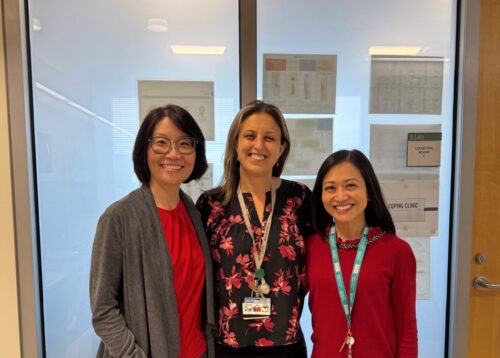Employee Resilience Program Tackles Burnout Caused by the Pandemic
March 11, 2022

Tempura, GETTY IMAGES
BMC program aims to combat the Great Resignation by addressing burnout and providing mental health counseling.
The COVID-19 pandemic has put an undeniable strain on healthcare systems, leading many employees to burnout. Amid the global pandemic, “burnout” reached epidemic proportions, with a study of U.S. healthcare workers showing 62% reporting mental health repercussions. Although the effects of burnout are widespread, they are also disproportionately affecting some employees more so than others. For example, female providers in surgery are more likely to experience depression and burnout than men in the same position. The surge in rates of burnout has caused so many workers to leave their positions it coined the term ‘The Great Resignation’, having significant implications on the workforce.
“As burnout research started to grow, there was a message that healthcare workers need to be more ‘resilient’, shifting the onus on the employee themselves,” said Gabby Farquhar, MPH, Employee Resilience and Wellness Program Manager at Boston Medical Center Health System. The Employee Resilience Program at BMCHS was established to confront that messaging and is taking a systems approach to building resilience across all levels of the organization. The Employee Resilience Program is a free confidential program centered on promoting recovery and inhibiting distress for all employees. “We understand how trauma impacts the brain now more than we have before,” says Beth Milaszewski, LICSW, Director of Employee Resilience Program. “It’s time to integrate that understanding into the workplace.”
In an effort to reach employees at the individual level, the program has established offerings that employees can utilize. In particular, there are two onsite licensed clinical social workers dedicated to supporting only employees. They provide coaching around Occupational Stress Injuries (OSIs), a workplace event that is physically or emotionally harmful as well as adversely affects the functionality and mental, physical, social, or emotional well-being of an individual. The program works to reinforce the message that “you’re not responding to these situations and stressors because you’re weak,” says Milaszewski. “You’re responding to this because you’re human.”
BMC launches mindfulness and wellness education and resources for employees
In 2018, BMCHS piloted an eight-week mindfulness program adapted from the mindfulness-based stress reduction (MBSR) curriculum to fight physician & administrative burnout. It was so successful, cutting rates of burnout in half, that the program was expanded and is now offered as a behavioral and mental health support resource for employees. Recently, BMC began offering free membership to Headspace for all employees, a science-backed mindfulness and meditation app. Since the launch, employees have mostly used the app to download mediation and sleep-guided content, with “self-compassion” being a top course consumed among employees. “There is a lot more that needs to be done on a political and systemic level in terms of supporting people’s well-being, but I think any opportunity that people have to simply be, and not have to do, is something to be treasured,” said Farquhar, who leads the MBSR program.
In addition to individual level support, the Employee Resilience Program also offers team trainings around Stress First Aid (SFA) which includes how to identify signs and symptoms of stress and how best to support yourself and others managing stress in the workplace. Recently, a Peer Support program was implemented within the Emergency Department. This provides confidential peer-to-peer support for employees who may have experienced an OSI. “Having peer support after an adverse event is one of the best buffers to distress,” explained Milaszewski. Beginning within the Emergency Department is only the first step, as the program anticipates implementing a peer support network within each department across the hospital system.
When discussing how the pandemic has changed her workload, Milaszewski says she is optimistic that it may have been the catalyst to change the stigma around mental health, especially in the healthcare setting. “I’ve seen more people reach out” she says, “I’m seeing more leaders talking about it, and that’s where I’m super excited.” However, the increasing number of people asking for help has caused a shortage in the number of available mental health providers. “Having to educate people as they’re looking for support to get through these times is something that I feel I’m doing more than I did before.” Managers and supervisors are able to schedule Resilience Rounds for their team to unpack any OSIs or challenges their team may be facing in the workplace. During these group sessions, the Employee Resilience Team offers education around the symptoms of stress, coping strategies for how to manage them, and where employees can find additional helpful resources.
Combatting burnout through an organizational and systemwide approach
Looking through the organizational lens, The Behavioral Health Advisory Council, a multidisciplinary group that includes the Senior Vice President & Chief of HR, Chief Medical Officer, Psychiatrist-in-Chief, and several University Medical Group representatives in psychiatry and in the Equity and Vitality Office, was formed to evaluate how the Boston Medical Center Health System is performing. The goal of this council is to ensure that resilience is being infused into different aspects of the organization, and brainstorm what is missing and solutions to find those pieces.
Part of this process has been successfully creating a well-being dashboard with key performance indicators to routinely track the organization’s progress. On this dashboard, it showcases that over 900 employees and Licensed Independent Practitioners have engaged with at least one Resilience and Behavioral Health support in 2021 and the “Behavioral and Mental Health Support” page averages just over 800 site visits per month. The Employee Resilience Team also added an additional Resilience Clinician which resulted in a higher capacity for individual coaching. “My hope is that people feel more compelled and inspired to reach out for help, seeing that a lot of their colleagues are taking those actions as well,” said Farquhar.


